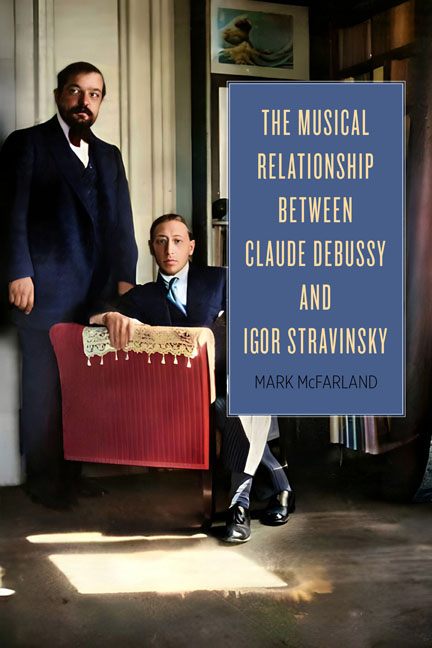Book contents
- Frontmatter
- Dedication
- Contents
- Acknowledgments
- Introduction
- 1 A Mutual Influence
- 2 Cinematic Montage and Stratified Form
- 3 Stratified Form in Debussy’s Works: 1909–1913
- 4 Debussy and the Chromatic Set
- 5 Stratified Form in Jeux
- 6 Stravinsky’s Waning Influence: 1914–1917
- Conclusion
- Glossary
- Bibliography
- Index
1 - A Mutual Influence
Published online by Cambridge University Press: 10 May 2024
- Frontmatter
- Dedication
- Contents
- Acknowledgments
- Introduction
- 1 A Mutual Influence
- 2 Cinematic Montage and Stratified Form
- 3 Stratified Form in Debussy’s Works: 1909–1913
- 4 Debussy and the Chromatic Set
- 5 Stratified Form in Jeux
- 6 Stravinsky’s Waning Influence: 1914–1917
- Conclusion
- Glossary
- Bibliography
- Index
Summary
Because the topic of this chapter is musical influence, specifically the musical influence between Debussy and Stravinsky, it is necessary to clarify the meaning of this term, at least as it will be used in this study. The concept of influence here involves the twin concepts of access and similarity and therefore derives from the “influence as generosity” theory exemplified by Rosen and Meyer. In literary criticism, this theory derives most clearly from T. S. Eliot's essay “Tradition and the Individual Talent.” It may be usefully compared with Harold Bloom's “influence as anxiety” theory, which has been applied to music in recent decades, most notably by Joseph Straus. Although they share a similar goal, these two theories of influence rely on radically different methodologies. Indeed, Taruskin has pointed out that Bloom rejects the two points fundamental to the “generosity” theory, namely access and similarity. Bloom considers the former as source study, and the latter, “weak.” This study will not consider Bloom's “anxiety of influence” theory or its revisionary ratios comprehensively and will concentrate instead on access and similarity. There is one exception, however: this chapter as well as chapter 6 discuss the element of competition on Debussy's part, something that lies at the heart of Bloom's theory.
While this study of the relationship between Debussy and Stravinsky is not unique, the issue of musical influence is most often studied from the vantage point of the influence of the older French composer on the younger Russian one. The clearest evidence of influence in this direction is the borrowing in the opening measures of Stravinsky's Le rossignol, which is a nearquotation of the opening of Debussy's “Nuages” (Clouds) from the Trois nocturnes (examples 1.1a and 1.1b). As similar as these two passages are, they may indeed both be indebted to a third, earlier source: Mussorgsky's “Les jours de fête sont finis” (The Holidays Are Over) from Sans soleil (Sunless) (example 1.1c). Stravinsky does not help clarify the true influence in this situation when he refers specifically to these opening measures as a “Mussorgsky-Debussy beginning.” To continue the study of Debussy's influence on Stravinsky, one would need to start with The Firebird and continue with Petrushka and The Rite of Spring, for, as revolutionary as the latter ballet was, Stravinsky said that it owed more to Debussy than to anyone else. This is obviously a very large topic, one left for another study.
- Type
- Chapter
- Information
- Publisher: Boydell & BrewerPrint publication year: 2024

